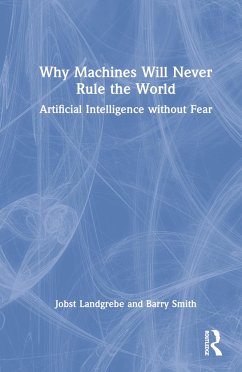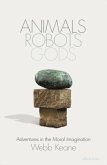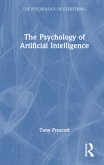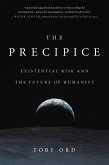The book's core argument is that an artificial intelligence that could equal or exceed human intelligence-sometimes called artificial general intelligence (AGI)-is for mathematical reasons impossible. It offers two specific reasons for this claim: Human intelligence is a capability of a complex dynamic system-the human brain and central nervous system. Systems of this sort cannot be modelled mathematically in a way that allows them to operate inside a computer. In supporting their claim, the authors, Jobst Landgrebe and Barry Smith, marshal evidence from mathematics, physics, computer science, philosophy, linguistics, and biology, setting up their book around three central questions: What are the essential marks of human intelligence? What is it that researchers try to do when they attempt to achieve "artificial intelligence" (AI)? And why, after more than 50 years, are our most common interactions with AI, for example with our bank's computers, still so unsatisfactory?¿ Landgrebe and Smith show how a widespread fear about AI's potential to bring about radical changes in the nature of human beings and in the human social order is founded on an error. There is still, as they demonstrate in a final chapter, a great deal that AI can achieve which will benefit humanity. But these benefits will be achieved without the aid of systems that are more powerful than humans, which are as impossible as AI systems that are intrinsically "evil" or able to "will" a takeover of human society.
Hinweis: Dieser Artikel kann nur an eine deutsche Lieferadresse ausgeliefert werden.
Hinweis: Dieser Artikel kann nur an eine deutsche Lieferadresse ausgeliefert werden.
"It's a highly impressive piece of work that makes a new and vital contribution to the literature on AI and AGI. The rigor and depth with which the authors make their case is compelling, and the range of disciplinary and scientific knowledge they draw upon is particularly remarkable and truly novel."
Shannon Vallor, Baillie Gifford Chair, Edinburgh Futures Institute, The University of Edinburgh
"The alluring nightmare in which machines take over running the planet and humans are reduced to drudges is not just far off or improbable: the authors argue that it is mathematically impossible. While drawing on a remarkable array of disciplines for their evidence, the argument of Landgrebe and Smith is in essence simple. Compulsory reading for those who fear the worst, but also for those inadvertently trying to bring it about."
Peter M. Simons, Professor, Department of Philosophy, Trinity College Dublin
"Just one year ago, Elon Musk claimed that AI will overtake humans "in less than five years". Not so, say Landgrebe and Smith, who argue forcefully that it is mathematically impossible for machines to emulate the human mind. This is a timely, important, and thought-provoking contribution to the contemporary debate about AI's consequences for the future of humanity."
Berit Brogaard, Professor, Department of Philosophy University of Miami
"This book challenges much linguistically underinformed AI optimism, documenting many foundational aspects of language that are seemingly intractable to computation, including its capacity for vagueness, its interrelation
with context, and its vast underpinning of implicit assumptions about physical, interpersonal, and societal phenomena."
Len Talmy, Professor, Center for Cognitive Science University at Buffalo
"Landgrebe and Smith orchestrate a battery of arguments from philosophy, biology, computer science, linguistics, mathematics and physics in order to argue effectively and with great brio that AI has been oversold. The result is a model of how to bring together results from many different fields and argue for an important thesis."
Kevin Mulligan, Professor, Department of Philosophy, University of Geneva
"Why, after 50 years, are AI systems so bad at communicating with human beings? This book provides an entirely original answer to this question-but it can be summed up in just one short phrase: there is too much haphazardness in our language use. AI works by identifying patterns, for instance in dialogue, and then applying those same atterns to new dialogue. But every dialogue is different. The old patterns never work. AI must fail. If you care, read the book."
Ernie Lepore, Distinguished Professor, Department of Philosophy, Rutgers University
"Wow - what a book! This mighty work of scholarship - profound yet lucid - is a definitive examination of a question that is exercising all of us. Its robust conclusion - that machines will not rule the world - is based upon a rich, nuanced account of the unique features of human nature and a demonstration of the physical and mathematical limits to computation that will frustrate any attempts to get anywhere near to replicating those features. Thanks to Landgrebe and Smith we are now free to think about the real threats (and promises) of the digital revolution."
Raymond Tallis, Emeritus Professor, University of Manchester
Shannon Vallor, Baillie Gifford Chair, Edinburgh Futures Institute, The University of Edinburgh
"The alluring nightmare in which machines take over running the planet and humans are reduced to drudges is not just far off or improbable: the authors argue that it is mathematically impossible. While drawing on a remarkable array of disciplines for their evidence, the argument of Landgrebe and Smith is in essence simple. Compulsory reading for those who fear the worst, but also for those inadvertently trying to bring it about."
Peter M. Simons, Professor, Department of Philosophy, Trinity College Dublin
"Just one year ago, Elon Musk claimed that AI will overtake humans "in less than five years". Not so, say Landgrebe and Smith, who argue forcefully that it is mathematically impossible for machines to emulate the human mind. This is a timely, important, and thought-provoking contribution to the contemporary debate about AI's consequences for the future of humanity."
Berit Brogaard, Professor, Department of Philosophy University of Miami
"This book challenges much linguistically underinformed AI optimism, documenting many foundational aspects of language that are seemingly intractable to computation, including its capacity for vagueness, its interrelation
with context, and its vast underpinning of implicit assumptions about physical, interpersonal, and societal phenomena."
Len Talmy, Professor, Center for Cognitive Science University at Buffalo
"Landgrebe and Smith orchestrate a battery of arguments from philosophy, biology, computer science, linguistics, mathematics and physics in order to argue effectively and with great brio that AI has been oversold. The result is a model of how to bring together results from many different fields and argue for an important thesis."
Kevin Mulligan, Professor, Department of Philosophy, University of Geneva
"Why, after 50 years, are AI systems so bad at communicating with human beings? This book provides an entirely original answer to this question-but it can be summed up in just one short phrase: there is too much haphazardness in our language use. AI works by identifying patterns, for instance in dialogue, and then applying those same atterns to new dialogue. But every dialogue is different. The old patterns never work. AI must fail. If you care, read the book."
Ernie Lepore, Distinguished Professor, Department of Philosophy, Rutgers University
"Wow - what a book! This mighty work of scholarship - profound yet lucid - is a definitive examination of a question that is exercising all of us. Its robust conclusion - that machines will not rule the world - is based upon a rich, nuanced account of the unique features of human nature and a demonstration of the physical and mathematical limits to computation that will frustrate any attempts to get anywhere near to replicating those features. Thanks to Landgrebe and Smith we are now free to think about the real threats (and promises) of the digital revolution."
Raymond Tallis, Emeritus Professor, University of Manchester








